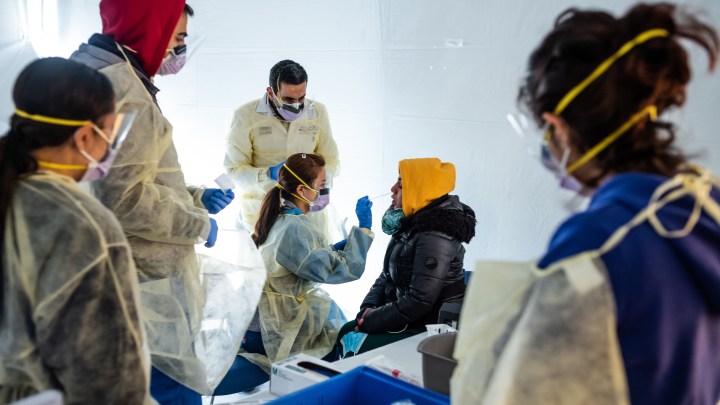
Losing a job hasn’t translated to losing health care — so far
Losing a job hasn’t translated to losing health care — so far

Open enrollment for health insurance ended Tuesday in the 36 states that use the federal marketplace HealthCare.gov.
Other states and Washington, D.C., have later deadlines.
And it’ll be a while before we have final numbers, but early indications are that the number of new people signing up for health coverage was about the same as last year. Despite the fact that millions of people lost their jobs this year — and presumably the health care that came with them.
Given what we know right now, the number of people who’ve lost health insurance in the pandemic is actually lower than experts worried it might be. Karen Pollitz of the Kaiser Family Foundation said one reason is “most of the people who have lost jobs during the pandemic didn’t have health insurance to begin with.”
Because their jobs in restaurants, retail and hospitality didn’t offer it.
Pollitz said many of those who did lose coverage through employers were able to replace it.
“People have been figuring out if they did lose job based coverage and if they still make too much for Medicaid, but they did have a qualifying event, they’re figuring out how to sign up for marketplace coverage,” Pollitz said.
That means the Affordable Care Act is working as intended, said Aviva Aron-Dine of the Center on Budget and Policy Priorities.
“And protecting people who have lost their jobs lost their coverage from becoming uninsured,” Aron-Dine said.
There are still about 29 million people who are uninsured. Many are eligible for free or low-cost coverage and just don’t know it.
Kavita Patel, a doctor in Washington D.C. and a fellow at the Brookings Institution, had an uninsured patient come in a couple of weeks ago.
“And when I said, ‘Have you looked into whether you qualify for Medicaid or potentially even a subsidy to buy health insurance?’ And she said, ‘I have no idea what you’re talking about,'” Patel said.
That’s common, she said, in large part, because the Trump administration almost eliminated funding for open enrollment marketing.
There’s a lot happening in the world. Through it all, Marketplace is here for you.
You rely on Marketplace to break down the world’s events and tell you how it affects you in a fact-based, approachable way. We rely on your financial support to keep making that possible.
Your donation today powers the independent journalism that you rely on. For just $5/month, you can help sustain Marketplace so we can keep reporting on the things that matter to you.


















